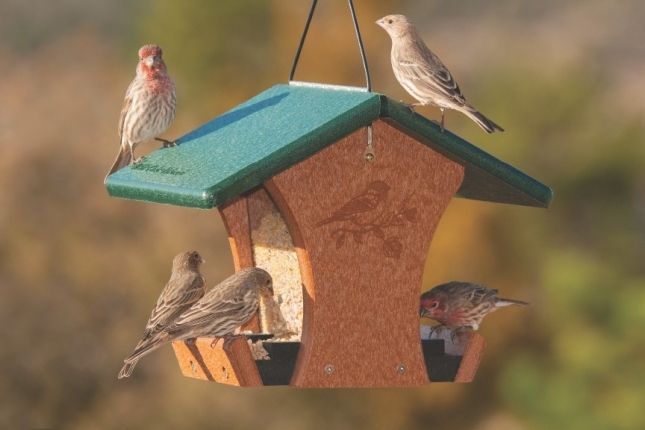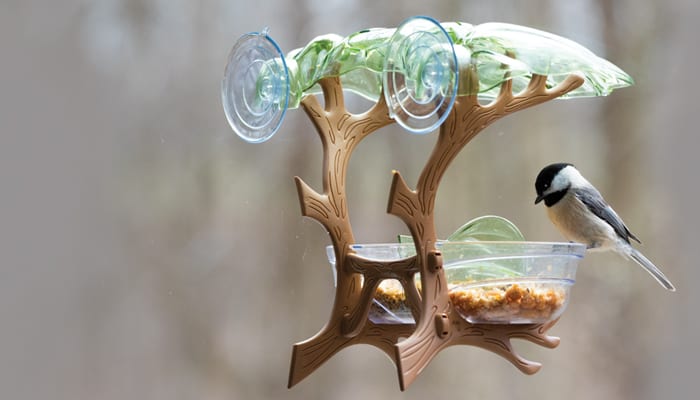Bird feeders serve as a delightful way to invite the beauty and charm of birds into our yards. Watching these feathered friends flock and flap around as they indulge in the food we provide can bring immense joy. However, with this joy comes a responsibility: the upkeep of our bird feeders. In this article, we'll explore why keeping bird feeders clean is crucial for the health and well-being of our avian visitors.
Preventing Disease Spread:
- Dirty bird feeders can become breeding grounds for bacteria, fungi, and parasites that can harm birds. When feeders are left uncleaned, old food residue accumulates, creating an environment ripe for pathogens to thrive. Birds that frequent contaminated feeders are at risk of contracting diseases such as salmonellosis, aspergillosis, and avian pox. Regular cleaning of feeders helps prevent the spread of these illnesses, ensuring the health of our feathered friends.

Maintaining Food Quality:
- Stale or spoiled food can pose a serious threat to bird health. Moldy or rancid seeds can cause digestive issues and nutritional deficiencies in birds. Additionally, wet or clumped food can harbor harmful bacteria. By keeping feeders clean and regularly replenishing them with fresh, high-quality birdseed, we provide birds with nutritious food that supports their energy needs, especially during times when natural resources are scarce.
Preserving Feeder Durability:
- Aside from the health implications for birds, neglecting feeder maintenance can also lead to structural damage. Accumulated moisture, mold, and debris can corrode or degrade feeder materials over time, compromising their integrity. By cleaning feeders regularly and inspecting them for signs of wear or damage, we can prolong their lifespan and ensure they continue to serve as safe and reliable feeding stations for birds.
Enhancing Bird Watching Experience:
- A clean feeder not only benefits the health of birds but also enhances the birdwatching experience for enthusiasts. Clear, unobstructed views of birds feeding at well-maintained feeders allow for better observation and appreciation of their behavior, plumage, and interactions. Regular cleaning also reduces the likelihood of unwanted visitors such as rodents or insects, ensuring that the focus remains on our feathered friends.

Tips for Proper Feeder Maintenance:
- Maintaining a clean feeder doesn't have to be a daunting task. Here are some tips to ensure proper feeder hygiene:
- Clean feeders with a mild detergent and warm water at least once a month, or more frequently if necessary.
- Use a bottle brush or scrubbing pad to remove stubborn debris and residue from feeder surfaces.
- Rinse feeders thoroughly and allow them to dry completely before refilling them with fresh seed.
- Dispose of any moldy or spoiled food promptly and sanitize feeding areas to prevent contamination.
- Regularly monitor feeder activity and cleanliness, adjusting cleaning frequency as needed based on bird traffic and environmental conditions.
Rotate Feeder Locations:
- Periodically rotate the placement of your bird feeders to prevent the buildup of waste and debris in one area. Moving feeders to different locations also reduces the risk of contamination from droppings and other pollutants. For a cleaner feeding experience, we recommend using the NO Mess Blend by Wild Birds Unlimited.
Use Feeder Accessories:
- Consider adding accessories such as tray liners or seed guards to your feeders to help contain mess and make cleaning easier. Tray liners can be removed and replaced regularly, while seed guards help prevent spillage and waste.

Practice Seasonal Maintenance:
- Adapt your feeder cleaning routine to reflect seasonal changes in bird activity and environmental conditions. During periods of heavy use, such as migration seasons or harsh weather, increase the frequency of feeder cleaning to ensure optimal hygiene.
Clean Surrounding Areas:
- In addition to cleaning the feeders themselves, pay attention to the surrounding area. Remove fallen seeds, hulls, and debris from the ground beneath feeders to prevent the buildup of mold and bacteria. Regularly sweep or rake the area to maintain cleanliness.
Monitor Water Sources:
- Birds require clean water for drinking and bathing, so ensure that any bird baths or water features in your yard are also kept clean and replenished regularly. Stagnant water can harbor bacteria and attract mosquitoes, posing health risks to birds.
Educate Others:
- Share the importance of feeder maintenance with friends, family, and neighbors who also enjoy feeding birds. Encourage them to adopt proper cleaning practices to promote bird health and well-being in their own yards.
- Seek Professional Help if Needed:
If you're experiencing ongoing challenges with feeder cleanliness or bird health, consider reaching out to your local Wild Birds Unlimited store for expert advice and assistance. Alternatively, you can also seek guidance from local birding organizations, wildlife rehabilitators, or veterinarians specializing in avian care. They can provide tailored solutions and support to address your specific concerns.
Conclusion:
As bird enthusiasts, it is our responsibility to provide a safe and healthy environment for the birds that visit our yards. By maintaining clean feeders, we not only protect the well-being of our avian visitors but also enhance our own enjoyment of birdwatching. Let's commit to keeping our feeders clean and ensuring that our feathered friends can continue to grace us with their presence for years to come.
